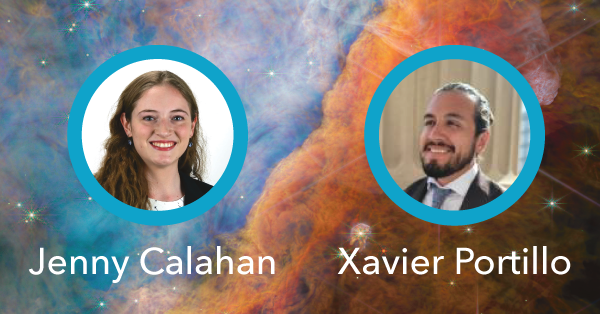The Kavli and Laukien Foundations Partner on Origins of Life Research
by The Kavli Foundation
New Kavli-Laukien Postdoctoral Fellowship Program and Inaugural Scholars Announced

The Author
The Kavli Foundation and the Laukien Science Foundation announce a new fellowship program to support scholars in the Harvard Origins of Life Initiative. The Kavli-Laukien Postdoctoral Fellows will join a community of faculty, senior researchers, graduate students, and undergraduates conducting research aimed at revealing if life is abundant in the universe. Through the initiative, the fellows will strive to understand how initial conditions on planets dictate the origins of life and its subsequent evolution.
The inaugural Kavli-Laukien Postdoctoral Fellows are Jenny Calahan and Xavier Portillo.
Jenny Calahan studies planet formation and astrochemistry and earned her Ph.D. in astronomy from the University of Michigan. In a recent publication, she and colleagues describe chemistry fueled by ultraviolet rays during later stages of planet formation.
Xavier Portillo studies RNA evolution, and earned his Ph.D. in molecular, cellular and developmental biology from Yale University. His research is aimed at evolving RNA molecules using directed evolution methods. He and collaborators recently witnessed the structural evolution of an RNA enzyme.

“Calahan and Portillo are very well suited to kick off this exciting new program,” said Greg Mack, science program officer at The Kavli Foundation. “The search for life in the universe connects astrophysics with chemistry and biology in a unique way — not only can their intersection help us understand how life can exist on other planets, but also how that relates to life here on Earth.”
Funding for postdoctoral fellows goes directly to Harvard’s Origins of Life Initiative for selection and management of the Kavli-Laukien Fellows. Two fellows will be selected each year for at least the next three years (2024-2026) for a term up to three years.
Frank H. Laukien, the CEO of Bruker Corporation and a visiting scholar in the Harvard Origins of Life Initiative, added: “The Laukien Science Foundation is very pleased to support Harvard’s Origins of Life research program, and now also the recently established international Origins Federation, together with The Kavli Foundation. We congratulate Jenny Calahan and Xavier Portillo on their selection as the first Kavli-Laukien postdoctoral fellows, and we look forward to their research contributions to understanding the origins of life on Earth, and to potentially discovering non-terrestrial life in our solar system and galaxy.”
“Partnerships are a powerful mechanism to fund scientific endeavors,” remarked Cynthia Friend, president of The Kavli Foundation. “By uniting around shared interests and pooling resources, we can have broader impact. Our work with Laukien and Harvard is one example of how The Kavli Foundation partners to advance science for the benefit of humanity.”
Life in the Universe and Origins Federation
The new Kavli-Laukien Fellows will take part in the inaugural Origins Federation conference, Life in the Universe, held September 12-15, 2023 at Harvard with support from The Kavli Foundation. The conference gathers international members of the larger Origins Federation at Harvard to facilitate innovative, collaborative research in this exciting field. Xavier Portillo is one of the speakers during the four-day convening, along with Nobel Laureate Didier Queloz, a member of the Kavli Institute for Cosmology at Cambridge University, and others associated with the Origins Federation consortium.
As Kavli-Laukien Fellows engage in the new initiative, they will work across disciplines and across institutions as they visit other labs involved in the Origins Federation, a consortium of four research centers based at Harvard, ETH Zurich, University of Chicago, and University of Cambridge. This new endeavor was announced at the American Association for the Advancement of Science meeting in March 2023 with founders describing the Federation’s goal of “facilitating efficient multidisciplinary and innovative collaborative research to advance our understanding of the emergence and early evolution of life, and its place in the cosmos.”
